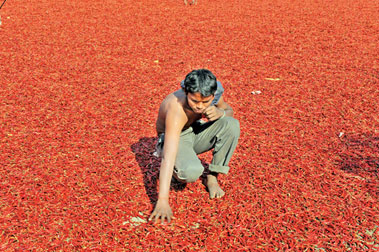Govt to subsidise essential food items
By Gamini WARUSHAMANA
The government is looking at the possibility of distributing several
essential food items at a subsidised price to ease the burden on
marginalised people suffering as a result of soaring food prices.
This proposal was discussed at a top level government meeting held
last week.
 |
|
Indian worker M. Naresh spreads out
red chillies to dry at a wholesale market in Hyderabad.
Soaring food prices in Asia are a deepening concern among
governments fearful of a repeat of the 2008 food crisis that
triggered riots across the region and beyond. The price
rises were caused by unseasonal monsoon rains which hit the
crops across south Asia. AFP |
Possible measures to curb increasing commodity prices were discussed
at this meeting that was called by the president.
Officials have pointed out that the government’s effort in
controlling prices of some essential commodities have failed as a result
of cartels in the wholesale and retail trade. The government is
concerned about the burden on the people who are suffering as a result
of sky rocketing prices of most of the essential food items.
However, a mechanism to provide this food subsidy to the targeted
people or the cost of such subsidy has not been finalised. It was
proposed to provide five or six essential food items under this scheme,
an official said.
According to market information prices of most of the main essential
food items remained high despite various measures taken by the
government. However, shortage of some goods ended when imported products
reached the market.
The price of big onions was around Rs. 120/kg last week, low compared
to a few weeks back. However, consumers expressed dissatisfaction over
the quality of the onions. The price dropped when imported onions from
Pakistan reached the market.
Egg and chicken prices too have shown a drop with Indian products
reaching the market. Locally produced potatoes too arrived on the
markets and were available at Rs.60-80/Kg.
Coconut prices remain high, over Rs. 35 a nut and there is no
short-term solution in sight to the crisis.
The authorities have taken ad hoc decisions to address the issue
without considering long term implications. According to sources over
200,000 coconuts imported from India have now reached the Colombo
harbour.
However, agriculture experts have warned over possible quarantine
issues that endanger coconut cultivation and the authorities have
decided to destroy the whole consignment.
How long will it take for prices to stabilise with local production
is the main concern of policy-makers. According to analysts it will take
several months because most of the crops have been badly damaged by the
continuing adverse weather conditions.
Recent reports said that thousands of hectares of paddy lands in main
paddy cultivation areas such as Ampara, Polonnaruwa and Anuradhapura
have been fully destroyed by heavy rains and floods. Vegetable and food
crops too have been damaged.
Some government decisions may also adversely affect industries in the
long run.
For instance the import of eggs and chicken may delay the recovery of
the poultry industry. The increased price of poultry products was the
signal for producers to increase production. Therefore excessive imports
may kill some industries.
However, cheap food imports is also not possible at this moment and
most of the food exporting countries too have been affected and are
practising protectionist measures such as banning exports. For instance,
India has faced political crisis over the high onion price. Some sectors
criticise the Indian government over its failure to control the price
and stop price manipulation. Onion production in India too has been
affected by unexpected rain.
Food price inflation has become a global issue again and many
countries are now talking about a food crisis. The United Nations Food
and Agriculture Organisation (FAO) last week warned that prices of basic
food commodities hit record highs last month, fuelling fears of
inflation and protectionism.
According to the UN’s latest food price index, December 2010 prices
overtook 2008 levels when spikes in prices triggered violent protests in
Latin America, Africa and Asia - demonstrating the immediate impact that
basic commodity price rises have on the world’s poorest populations.
China and India too are in a crisis with increasing food price
inflation.
The UN food price index tracks the wholesale cost of several
agricultural commodities, including wheat, corn, rice, oilseeds, dairy
products, sugar and meats and it has risen by 32 percent in the second
half of 2010, up from 167 in July to 215 in December. According to the
UN with droughts and floods hitting harvests across the world,
forecasters predict further food price increases in 2011.
Floods in Australia have damaged 40 percent of its farmland and this
will have a great impact on commodity prices. Australia is the fourth
largest exporter of wheat and sugar.
|

